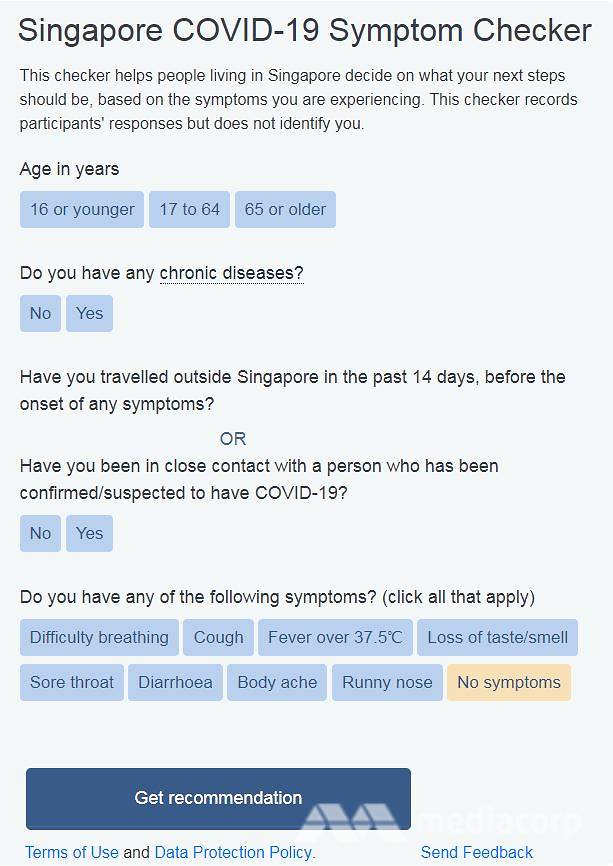SINGAPORE: Members of the public who are worried they might have COVID-19 can now use an online screening tool to run a quick self-check and get basic advice.
Launched on Friday (Apr 3) by the National University Health System (NUHS), National Centre for Infectious Disease (NCID) and the Ministry of Health Office for Healthcare Transformation (MOHT), the COVID-19 Symptom Checker aims to help people navigate the healthcare system and gain clarity about what to do if they feel unwell.
Those with flu-like symptoms can now go to www.sgcovidcheck.com where they can answer a series of questions to determine whether they should monitor their symptoms for a few more days or go see a doctor, as well as information about where to get medical attention.
The tool will suggest options for care based on the person’s age, recent travel history, people they may have been exposed to and their symptoms.
“The user receives immediate suggestions on possible next steps, be it continuing to monitor their symptoms or seeking medical attention at the appropriate healthcare setting,” said the authorities in a joint media release.
“While the tool does not dispense medical advice, it helps with navigating the healthcare system.”
READ: Fifth COVID-19 death recorded in Singapore
The checker follows similar online screening options launched in the United States, China and some countries in Europe, tailoring information to a Singaporean context.
The site does not collect personally identifiable data, according to the authorities. Patient identifiers are not used in the symptom checker, but data collected give an overview of the different types of patients who are worried about COVID-19 and who use the site.
“These yield insights on important predictors of health-seeking behaviour and drive better healthcare resources allocation,” said the authorities in a fact sheet about the tool.
“It also gives insights into where the needs are and what people are most concerned about, which helps MOH with patient education and communications efforts.”
The tool was developed after statistics from the Ministry of Health (MOH) showed 24 per cent of COVID-19 patients in Singapore had been consulting multiple doctors in a short period of time (“doctor-hopping”).
Teams from NCID, NUHS, and the National University of Singapore provided the clinical advice for the platform.
Its usability was then validated by a team led by Dr Franco Wong, head of Jurong Polyclinic.

Screengrab of the COVID-19 symptom checker.
There are plans to expand the scope of the checker to include more features such as pre-registration for consultations at clinics or access to telemedicine providers, said the joint release.
Other planned features include information on waiting times at emergency departments, directly linking those who need testing to appropriate healthcare facilities and a heatmap on COVID-19 infections clusters.
Information about how people are using the tool can also be used to track the behaviour of the virus, said Dr Praveen Deorani, a data scientist at MOHT.
“With more people using the checker, and with our subsequent analysis of how it is being used, we can then use machine learning techniques to track the behaviour of the virus (and the symptoms it manifests) so the patient can elect the right locus of treatment at the right time,” he said.
The symptom checker can also be found on MOH’s website under COVID-19 Resources and on MOH’s HealthHub.
Singapore has been coming up with various technology-based solutions to fight the pandemic.
Last month, the authorities launched a mobile application called TraceTogether, which seeks to boost the contact tracing process.
A total of 1,049 people have been diagnosed with COVID-19 in Singapore as of Thursday.
On Friday the country reported its fifth death related to the disease, an 86-year-old Singaporean woman with no recent travel history to affected countries and regions.
BOOKMARK THIS: Our comprehensive coverage of the coronavirus outbreak and its developments
Download our app or subscribe to our Telegram channel for the latest updates on the coronavirus outbreak: https://cna.asia/telegram




